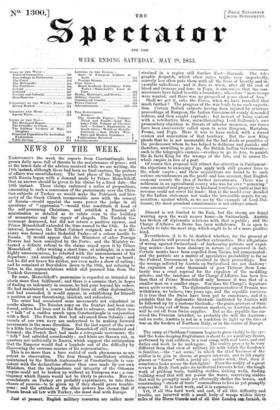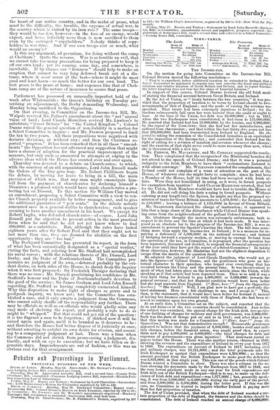The camp 'at Chobham Common begins to grow visibly to
the eye; and the home-keeping Englishman is about to see a military drama, performed by real soldiers, in a real camp, with real tents, and real duties and work to be undergone. The reality proves to be very different from that view of military life with which the Londoner is familiar,—the " set scene," in which the chief business of the soldier is to join in chorus at proper intervals, and to lift empty glasses or " horns " with ajovial air; sadder work, that, than it sometimes looks across the foot-lights ! Even the reality of a great review in Hyde Park pales its ineffectual fervours before the tough work of pitching tents, building stables, sinking wells, finding building-wood that will not poison the water, contriving stables that will be promptly made yet effectually shelter the horses, and construoting "streets of tents " commodious to live in yet promptly removeable. It is hard work, and it is expensive. Yet, if all this hard work and cost, if all this difficulty and trouble, are incurred with a small body of troops within thirty miles of the Rom Ovards and of all that London can furnish, in
the heart of our native country, and in the midst of peace, what must be the difficulty, the trouble, the expense of actual war, in the country which is visited by its iron rule ? The same troops— they would be too few, however—in the face of an enemy, would expect, and have, infinitely more than is now sacrificed to them even by the outraged " eopyholders." Nobody thinks of copy- holders in war-time. And if our own troops cost so much, what would an enemy's ?
Is this any argument, ad pecuniam, for doing without the camp at Chobham ? Quite the reverse. War is so terrible an evil, that we cannot take too many precautions for being prepared to keep it off our own land ; yet its coming, some day, and somewhere, is inevitable. If by chance our " firmness " should help to make an eruption that cannot be very long deferred break out at a dis- tance, where it must occur at the best—where it might do must good and least harm—so much the better for our own land. The best peace is the peace at home ; and expenses like that of Chob- ham camp are of the nature of insurance to secure that peace.



































 Previous page
Previous page